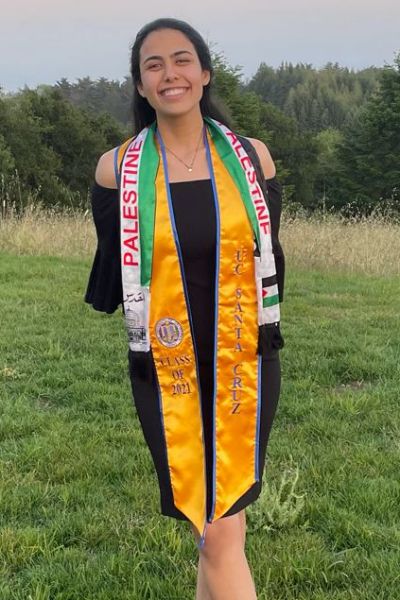When Nabeela Ariqat's family moved from Jordan to the United States, they hoped to escape from turmoil. The reality was much more complicated.
"My mother moved here to meet up with my father who was here via a green card," said Ariqat, who was only 3 when she arrived in the United States. "My mom also had the American dream in her mind. She thought everything would be OK when we were in America, which wasn't the case."
Fatefully, the family arrived in the U.S. one month before the 9/11 terror attacks.
"We were faced with discrimination and hate on every corner [after 9/11] since my mother wore the hijab," Ariqat said. "We also did not have a stable living situation here so it was very hard for my mom. It was a difficult transition, especially since none of us spoke English."
Ariqat, a first-generation college student, hoped for a new beginning at UC Santa Cruz, which she attended in part because "I felt like I could be who I was," she said. "My first year of college I was excited when I was placed in Oakes and saw that there were many students who looked like me, pursuing a degree in STEM [science, technology, engineering, and mathematics]."
She was initially discouraged when she saw how many of her peers dropped their STEM studies. And her family's financial situation almost cut her dream short.
"During my first quarter my family got evicted from our home and I needed to make money fast to help out more," Ariqat said.
Ariqat had to increase her hours working at an In-N-Out Burger fast-food restaurant to cover the family's expenses.
But the interventions of two caring mentors, campus STEM Diversity Programs Director Yulianna Ortega (Merrill '09, Latin American and Latino studies and biology) and Professor of Molecular, Cell and Developmental Biology Grant Hartzog, restored her hope.
Hartzog helped her apply for multiple scholarships and plan out her classwork at UCSC.
"Not only did he help me academically, but he also helped me understand the imposter syndrome ingrained in me," Ariqat said. "He helped me see that I was doing great even with working 30–35 hours a week with 15–22 units of classwork."
As an honors fellow in the Maximizing Access to Research Careers (MARC) Program, she had hands-on experience working in laboratory settings.
But Ariqat also took the time to help other first-generation students trying to find their way, serving as a STEM diversity peer tutor, secretary of Planned Parenthood Generation Action at UCSC, and president of the UC Santa Cruz chapter of the Society for Advancement of Chicanos/Hispanics and Native Americans in Science (SACNAS).
Ariqat made it her mission to supply students with any resources they needed, and to help them feel safe speaking out about their experiences at UCSC.
These days, Ariqat is working in the laboratory of Lindsay Hinck, professor of molecular, cell, and developmental biology, studying the effects of DNA damage on the lactation process.
She plans to take two ambitious "gap years" between her undergraduate and graduate work, researching in the laboratory of UC San Francisco Professor of Biochemistry and Biophysics Martin Kampmann, before applying to graduate school in a medical scientist training program.
Though she's eager for her next step, she will miss her STEM Diversity Programs and her whole SACNAS family. But the thing she'll miss most is walking out of her dorm, or the Biomedical Science Building, and finding herself in a peaceful redwood forest, reflecting on her journey.



